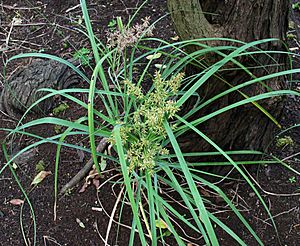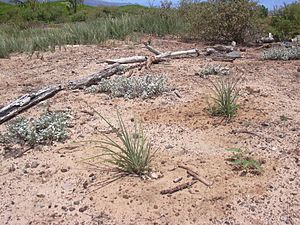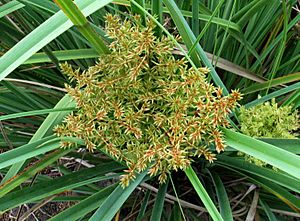Javanese flatsedge facts for kids
Quick facts for kids Javanese flatsedge |
|
|---|---|
 |
|
| Cyperus javanicus habit and inflorescence | |
| Scientific classification | |
| Genus: |
Cyperus
|
| Species: |
javanicus
|

The Javanese flatsedge, officially called Cyperus javanicus, is a type of grass-like plant. It belongs to the Cyperaceae family, which includes many sedges. This plant originally comes from places like Indonesia and Australia.
What Does the Javanese Flatsedge Look Like?
This plant is a perennial, meaning it lives for more than two years. It grows from rhizomes, which are underground stems. These stems help the plant spread and grow new shoots.
The Javanese flatsedge often looks a bit blue-green, which is called "glaucous." It usually grows in clumps, like a tuft of grass. It can reach a height of about 0.6 to 1.2 meters (2 to 4 feet).
This plant produces brown flowers. It blooms for a long time, usually between January and August. The main stems, called culms, have three sides and feel a bit bumpy.
Its leaves are long and flat on top. They are folded at the bottom, near the base of the plant. These leaves can be about 2 to 13 millimeters (0.08 to 0.5 inches) wide.
The plant's flowers grow in a group called an inflorescence. These flower clusters have several main branches, usually six to twelve of them. Each branch can be up to 8 centimeters (3 inches) long.
How Scientists Name This Plant
The Javanese flatsedge was first officially described by a botanist named Martinus Houttuyn. He wrote about it in 1782 in his book, Natuurlijke Histoire.
Over time, other scientists gave it different names. But today, Cyperus javanicus is the accepted scientific name.
Where Does the Javanese Flatsedge Grow?
This plant is native to several places. It naturally grows in Indonesia and Australia.
In Australia, you can find it in Western Australia. It grows near pools, streams, and rivers in the Kimberley region. It likes sandy-clay soils there.
It also grows naturally in the Northern Territory and the northeastern part of Queensland. This includes the Cape York Peninsula.
Beyond Australia, it is native to islands north of Australia. These include Papua New Guinea, Timor, and other parts of Indonesia.
The Javanese flatsedge has also been introduced to new places. It now grows in Hawaii and on other islands in the Pacific basin. This means people or nature helped it spread to these areas.


